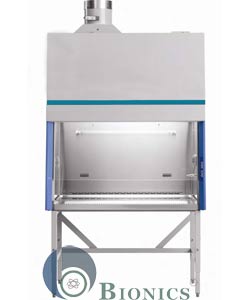Enhancing Laboratory Safety with Class 2 Biosafety Cabinets and Microbiological Protection

In today’s scientific and clinical labs, safety for personnel and samples is non-negotiable. Whether it's conducting biological tests, diagnostics, or experiments with infectious agents, biosafety cabinets play an integral role in contamination prevention and sample integrity.
Among the available options, Class 2 Biosafety Cabinets stand out for their balanced protection. These units are indispensable tools for pathogen handling and biological research.
Overview of Biosafety Cabinets in Laboratory Environments
Biosafety cabinets are airflow-controlled workspaces engineered for microbiological safety. They use HEPA filtration to remove contaminants from incoming and outgoing air.
These units are generally classified into Classes I, II, and III depending on airflow and application needs. Among these, Class 2 biosafety cabinets are the standard choice for most applications.
Defining Class 2 Biosafety Cabinets and Their Role
Class 2 Biosafety Cabinets are designed to safeguard three aspects: the operator, the sample, and the environment. They generate a vertical airflow that reduces turbulence and contamination.
Air is treated using dual filtration systems to ensure safe circulation and exhaust. These cabinets are frequently used in labs handling infectious agents or clinical samples.
What Makes Class 2 Cabinets Effective in Labs
A Class 2 microbiological safety cabinet includes several integrated safety mechanisms such as:
• High-efficiency air filters to ensure clean workspace air
• Uniform downward airflow to protect the sample zone
• Negative pressure barriers to prevent leakage
• Built-in UV sterilisation for decontaminating surfaces
• Low sound emissions to reduce fatigue
• Transparent sash or viewing window for easy access and monitoring
These elements support lab workers in maintaining sterile working environments.
Where Class 2 Cabinets Are Used
Class 2 Biosafety Cabinets are key equipment in healthcare, molecular biology, and quality control. They are critical for DNA/RNA extraction, pathogen culture, and molecular assays.
Hospitals, research labs, and manufacturing units depend on these cabinets for contamination control.
Benefits of Using Class 2 Biosafety Cabinets
Using Class 2 cabinets offers multiple advantages including operator protection and experimental reliability:
• Protects the integrity of lab work
• Acts as a barrier between user and biohazard
• Ensures filtered air is safe for release or recirculation
These cabinets combine safety features with operational efficiency.
Cabinet Types and Global Compliance
Top manufacturers design units compliant with major biosafety regulations worldwide. Class 2 units are sub-classified as A1, A2, B1, and B2—with each type offering different air handling systems.
• Type A2: Recirculates 70% and exhausts 30% of filtered air
• Type B2: Used for hazardous vapors and chemicals
Choosing the correct subtype is vital for achieving optimal safety and functionality.
Choosing the Right Biosafety Cabinet
Before purchasing, consider:
• The biosafety level required (BSL-1, BSL-2, or BSL-3)
• Available lab space and utility infrastructure
• Ease of use, energy efficiency, and upkeep
• Manufacturer reputation and post-sale support
Partnering with a trusted provider helps meet both performance and safety needs.
Best Practices for Using Class II Biosafety Cabinets
For optimal results:
• Install the cabinet in a draft-free, low-traffic zone
• Get periodic validation from certified technicians
• Ensure operators follow best practices
Operational best practices include:
• Always wear appropriate lab PPE
• Work calmly to prevent airflow disturbances
• Wipe work areas with disinfectants regularly
• Never activate UV when humans are present
Conclusion
Class 2 biosafety cabinets are a cornerstone of any safe, efficient laboratory. They protect workers, secure samples, and copyright environmental standards.
From biotech and diagnostics to academia and pharma, Class 2 Biosafety Cabinets Class II cabinets copyright the highest biosafety levels. When investing in a biosafety cabinet, opt for trusted brands that offer end-to-end service—because your research deserves the best protection.